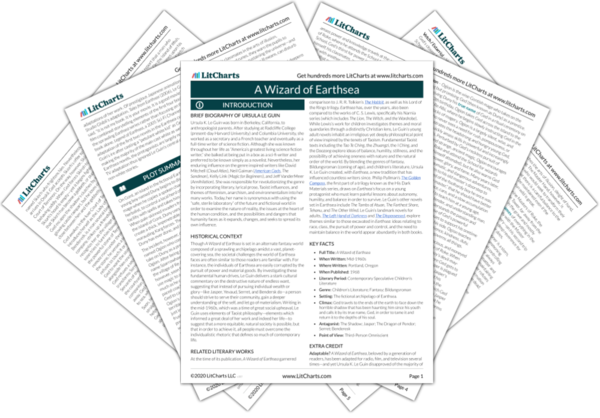Throughout A Wizard of Earthsea, true names symbolize the intense power of being seen, known, and accepted as one truly is—a concept that relates profoundly back to several of the novel’s major themes, including coming of age, identity and the shadow self, and cosmic balance. In the world of Earthsea, individuals are given names just as they are in the real world—but in Earthsea, every living thing, whether it is a human, a plant, an animal, or a mineral, also has a hidden true name that defines its essence. Knowing another’s true name is a powerful thing: true names can be used to summon someone, to bind them to one’s will, or to otherwise control them. It is thus very vulnerable for the characters in the novel to share their true names with one another, yet several characters do just that in order to demonstrate love, trust, and goodwill, such as when Vetch offers Ged his true name (Estarriol) upon departing Roke. Much of the magic Ged and his classmates at the School on Roke learn has to do with divining true names. A thing cannot be changed or transformed without knowledge of its true name. Wizards-in-training spend months at a time studying the true names of every living thing in isolation at a tower far away from the school itself in order to devote themselves to full understanding of how consequential possession of a thing’s true name is.
Whenever someone invokes a thing or a person’s true name, then, it symbolizes that that person or thing’s essence is wholly known to them. Because Ged’s journey is a journey of self-discovery, it is fitting that in order to best the shadow which has pursued him across Earthsea since his school days can only be defeated with its true name. When Ged realizes that the shadow’s true name is Ged—his own name—it shows that he has at last come to understand himself wholly, and that he at last has power over his own destiny. To master a thing’s name is to master the thing itself—and yet all residents of Earthsea are duty-bound to use the true names they learn throughout the course of their life carefully, making sure not to disturb the careful balance of the universe by changing, controlling, or corrupting even a single blade of grass without understanding the consequences. Through the symbol of true names, Le Guin argues that to be a part of the world is to take responsibility for all of it—and to learn a thing’s true name is to learn exactly what one is assuming responsibility for.
True Names Quotes in A Wizard of Earthsea
He crossed to the far bank, shuddering with cold but walking slow and erect as he should through that icy, living water. As he came to the bank Ogion, waiting, reached out his hand and clasping the boy's arm whispered to him his true name: Ged.
“To change this rock into a jewel, you must change its true name. And to do that, my son, even to so small a scrap of the world, is to change the world. […] You must not change one thing, one pebble, one grain of sand, until you know what good and evil will follow on that act. The world is in balance, in Equilibrium. A wizard’s power of Changing and of Summoning can shake the balance of the world. It is dangerous, that power. […] It must follow knowledge, and serve need. To light a candle is to cast a shadow…”
If the student complained the Master might say nothing, but lengthen the list; or he might say, "He who would be Seamaster must know the true name of every drop of water in the sea."
"Lord Gensher, I do not know what it was—the thing that came out of the spell and cleaved to me—"
"Nor do I know. It has no name. You have great power inborn in you, and you used that power wrongly, to work a spell over which you had no control, not knowing how that spell affects the balance of light and dark, life and death, good and evil. And you were moved to do this by pride and by hate. Is it any wonder the result was ruin?”
No one knows a man's true name but himself and his namer. […] If plain men hide their true name from all but a few they love and trust utterly, so much more must wizardly men, being more dangerous, and more endangered. Who knows a man’s name, holds that man's life in his keeping. Thus to Ged, who had lost faith in himself, Vetch had given that gift only a friend can give, the proof of unshaken, unshakable trust.
"I have no strength against the thing," Ged answered.
Ogion shook his head… […] "Strange," he said: "You had strength enough to outspell a sorcerer in his own domain, there in Osskil. You had strength enough to withstand the lures and fend off the attack of the servants of an Old Power of Earth. And at Pendor you had strength enough to stand up to a dragon."
"It was luck I had in Osskil, not strength," Ged replied, and he shivered again as he thought of the dreamlike deathly cold of the Court of the Terrenon. “As for the dragon, I knew his name. The evil thing, the shadow that hunts me, has no name."
“All things have a name," said Ogion.












